Bybit | Bitget | |
Supported Coins | +650 | +800 |
Spot Trading Fees | 0.10%
For both maker and taker orders. The more you trade, the lower the fees – can decrease to as low as 0.02%. Using Bybit's native token, BYD, to pay trading fees offers a 20% discount | 0.10%
For both maker and taker orders. The more you trade, the lower the fees – can decrease to as low as 0.02%. Using Bitget's native token, BGB, to pay trading fees offers a 20% discount /span> |
Future Trading Fees | 0.025% – 0.075%
0.075% for taker trades and 0.025% for maker trades. Using Bybit's native token, BYD, to pay trading fees offers a 10% discount | 0.02% – 0.06%
0.06% for taker trades and 0.02% for maker trades. Using Bitget's native token, BGB, to pay trading fees offers a 20% discount /span> |
Our Rating |
(2.9/5) |
(3.9/5) |
Read Review | Read Review |
Bybit vs. Bitget: Compare The Best Features
Bybit and Bitget are two powerful cryptocurrency exchanges that cater to different user needs. Each platform excels in unique areas, from user experience to advanced trading features.
In this comparison, we’ll look at key aspects such as ease of use, cryptocurrency selection, Web3 integration, and advanced trading capabilities to help you choose the best fit for your needs.
-
Ease of Use & Mobile App Experience
Bybit offers a user-friendly interface with a clean layout, making it easy to navigate between different markets, including spot, margin, and futures trading.
However, the advanced features may overwhelm beginners. The mobile app mirrors the desktop experience, offering flexibility for trading on the go.

Bitget also prioritizes simplicity with a sleek interface that caters to both beginners and experienced traders.
Its mobile app offers an almost identical experience to the desktop platform, allowing users to trade and manage their portfolios efficiently.
However, some advanced charting features are missing on the mobile app.
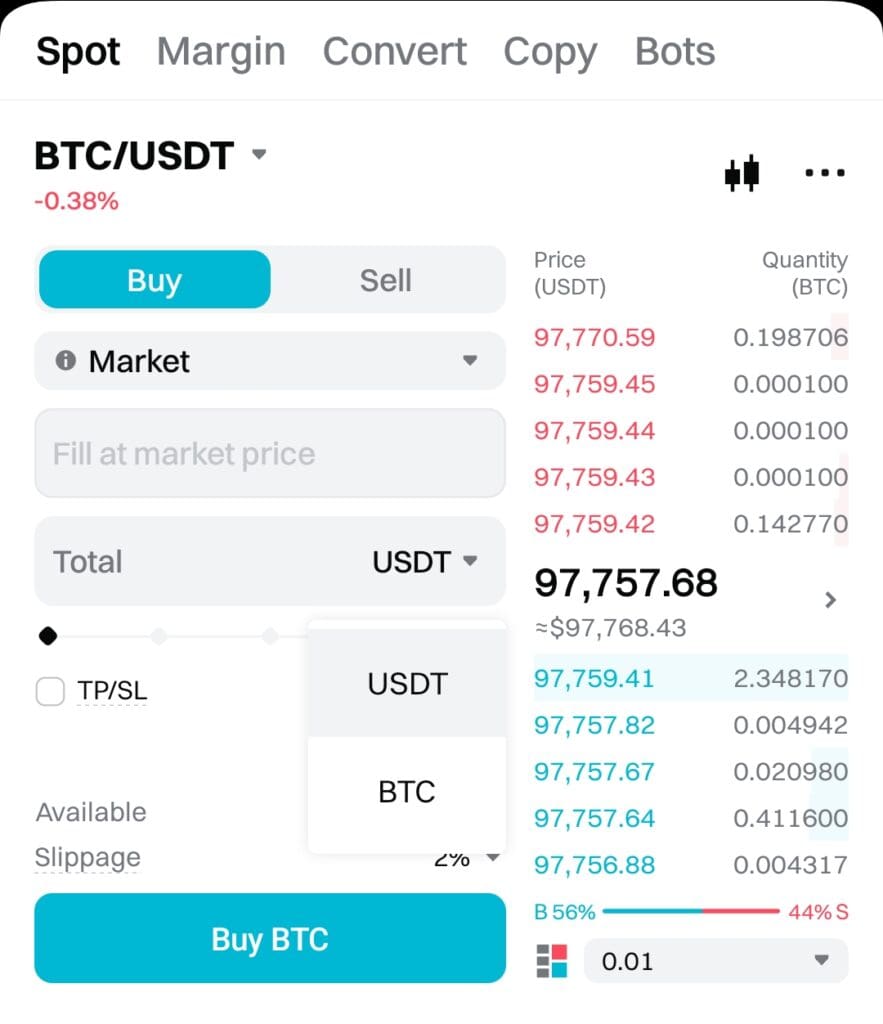
Overall, while both exchanges offer solid mobile app experiences, Bitget may be slightly more accessible for beginners due to its intuitive design.
-
Cryptocurrency Selection
Bybit offers +650 cryptocurrencies, including major tokens like Bitcoin, Ethereum, and several stablecoins. It also provides access to altcoins and has expanded into NFTs.
The platform supports spot, margin, and futures trading, offering a wide range of trading options.
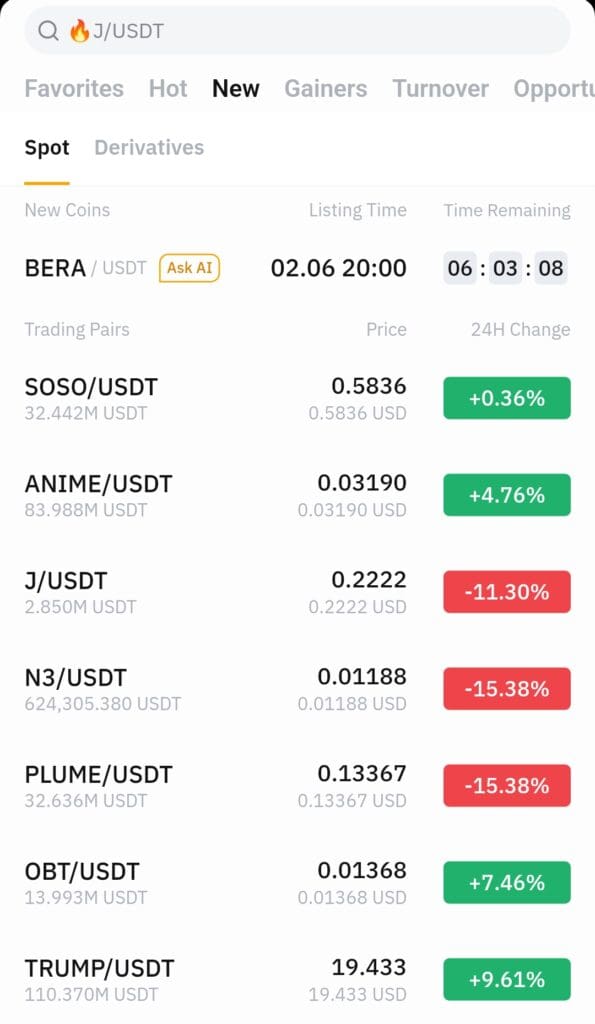
Bitget boasts a larger selection, with +800 cryptocurrencies available, including popular coins and stablecoins. In addition to spot and futures trading, Bitget provides margin trading, giving users more options to diversify their portfolios.
However, Bitget lacks support for NFTs or Web3-related assets.
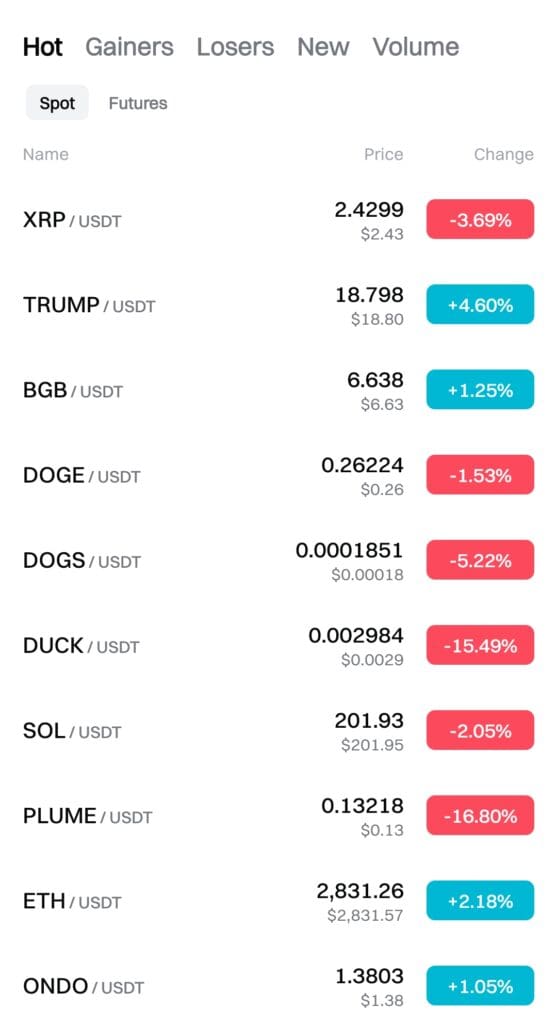
-
Trading Crypto Features & Experience
Both platforms provide advanced tools, but Bybit offers deeper integration with charting tools and more automated trading options, making it a better choice for traders seeking extensive control over their strategies.
Bybit excels in providing advanced trading features such as spot, margin, and futures trading with low fees, up to 125x leverage for futures.
It integrates TradingView for in-depth charting and offers copy trading to follow experienced traders.
Bybit also offers automated trading with bots like the DCA (Dollar-Cost Averaging) bot and Grid bots for managing market volatility.

Bitget offers similarly advanced trading features, including high leverage up to 125x for futures and margin trading. It also supports copy trading, letting users replicate top traders' strategies.
Bitget offers a Launchpad for early-stage investments and provides access to advanced order types like trailing stops and take-profit options.
However, it lacks the TradingView integration found on Bybit.

-
Staking Options and Rewards
Bybit offers both flexible and fixed-term staking products through its Bybit Earn platform.
Users can stake assets like BTC, ETH, and USDC with fixed APYs, which are guaranteed for the duration of the staking period. Rewards are distributed daily, and the principal is returned at the end of the term.
Additionally, Bybit provides a liquid staking option for Solana (SOL), allowing users to earn rewards while retaining liquidity and participating in the Solana DeFi ecosystem.

Bitget offers a wide range of staking options, including assets like ETH, SOL, DOT, and LUNA, with APYs ranging from 5% to over 15%.
Rewards are distributed daily, and the staking process is straightforward, requiring no technical setup.
Bitget's staking is based on Proof-of-Stake (PoS) networks, ensuring low-risk, principal-protected income.
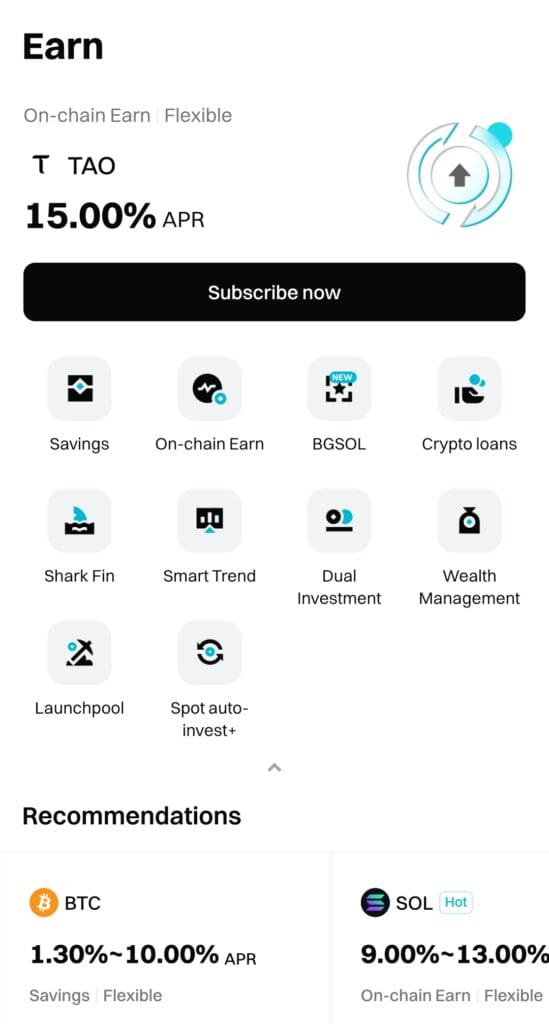
-
DApps and Web3 Integration
Bybit has embraced Web3 with its NFT marketplace, allowing users to buy, sell, and showcase Ethereum and Solana-based NFTs.
The platform also supports decentralized applications (dApps), providing a gateway into blockchain gaming and decentralized finance (DeFi) directly from the exchange.
Bitget does not support NFTs or direct Web3 features. However, it focuses more on crypto-to-crypto and fiat-to-crypto markets.
While it does not have Web3 integration, Bitget offers users access to DeFi products and projects through its Launchpad, where new token sales are offered.
Bottom line, Bybit stands out for its seamless Web3 and NFT integration, while Bitget focuses on crypto trading and early-stage project access through Launchpad.
-
Wallet Options
Bybit provides a non-custodial Web3 wallet, allowing users to manage their own private keys and interact with decentralized applications (dApps).
The wallet supports multiple blockchains and offers features like staking and NFT management.
Bitget offers a multi-chain wallet that supports various cryptocurrencies and dApps. The wallet is integrated with the exchange, providing seamless transfers between the wallet and trading accounts.
-
Trading Bots and Automation
Bitget provides automated trading through its Trading Bots, allowing users to set up strategies that run without manual intervention.
The platform offers various bots, including the Spot Grid Bot and DCA Bot, catering to different trading strategies.
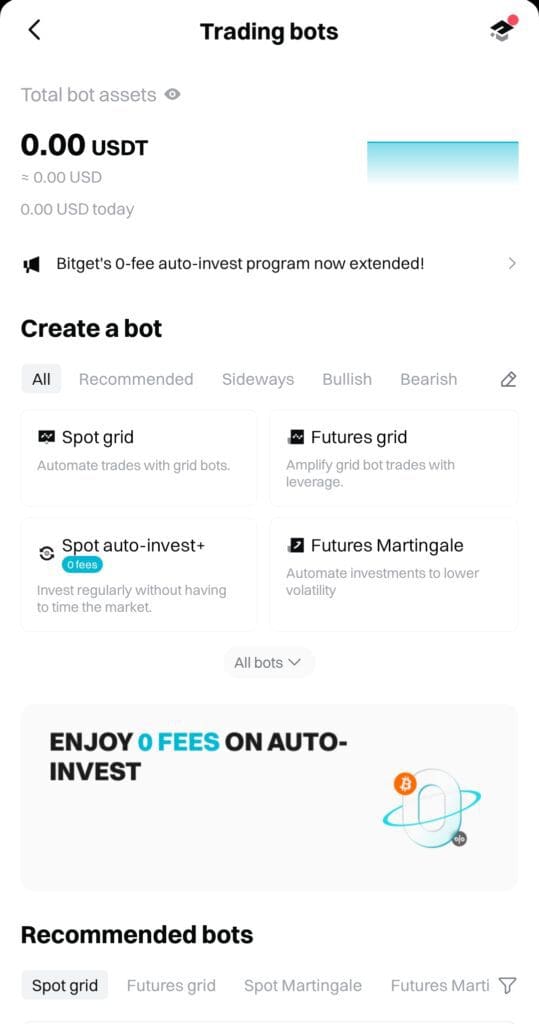
Bybit offers automated trading through its Trading Bots, including the Spot Grid Bot for price volatility and the DCA (Dollar-Cost Averaging) Bot for consistent investments over time.
These bots are especially useful for those who want to capitalize on market movements without needing to constantly monitor the market.
-
Security Measures And Past Hacks
Bybit employs industry-standard security measures, including encryption, two-factor authentication (2FA), and withdrawal whitelisting.
However, in February 2025, Bybit suffered a significant security breach resulting in the theft of approximately $1.5 billion in digital assets, primarily Ethereum.
Bitget has not been involved in any major legal issues or lawsuits as of now.
It follows industry-standard security practices, including encryption, two-factor authentication (2FA), and withdrawal whitelisting, to protect user funds and data.
Who Should Consider Bybit Exchange?
Bybit is best suited for experienced traders looking for advanced tools and high leverage. Its features make it ideal for those with a strong understanding of crypto markets.
Advanced Traders: Bybit offers sophisticated trading tools, such as futures and margin trading, with leverage up to 125x, making it ideal for professional traders.
NFT Enthusiasts: The platform supports NFTs and integrates Web3 features, catering to users interested in digital art and collectibles.
Frequent Traders: With a tiered fee structure, Bybit rewards high-volume traders with lower fees.
Experienced with Automation: Trading bots, like Grid and DCA bots, allow traders to automate strategies, making it appealing for those looking to maximize returns without constant monitoring.
Who Should Consider Bitget Exchange?
Bitget stands out for its flexibility and security, appealing to both beginners and experienced traders. It offers a robust platform for trading and investing.
Beginners: Bitget’s simple interface and easy staking options make it perfect for new traders.
Leverage Traders: Offering 125x leverage for futures trading, Bitget caters to those seeking to amplify potential profits.
Diversifiers: With over 800 cryptocurrencies, including many altcoins and tokens, Bitget attracts traders looking to diversify their portfolios.
Security-Conscious: Bitget’s $400 million protection fund and robust 2FA provide enhanced protection, appealing to users prioritizing security.
Conclusion
Bybit excels with its advanced trading tools, leverage, and integration of NFTs and Web3 features, making it ideal for professional traders.
On the other hand, Bitget shines with its user-friendly interface, security features, and a broader range of cryptocurrencies, making it a versatile platform for both beginners and experienced traders.
